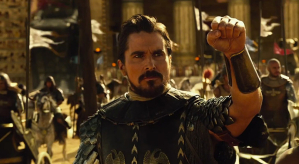
Egypt has reportedly banned the biblical film "Exodus: Gods and Kings" because of what the country's government calls historical innaccuracies and "racism."
Egypt's Culture Ministry explained its decision in a statement released this weekend that points to the depiction of Egyptians as "savages" and Jews as powerful, as seen in their armed rebellion against the Egyptians in the film. The ministry explained that religious scriptures present the Jewish people as weak and oppressed, so they see this film depiction as racist.
Objections from the ministry target "intentional gross historical fallacies that offend Egypt and its pharaonic ancient history in yet another attempt to Judaize Egyptian civilization, which confirms the international Zionist fingerprints all over the film."
Exodus: Gods and Kings is a new film directed by Ridley Scott and starring Christian Bale as Moses. The movie is described as "biblically inspired" to depict the exodus of the Hebrew people from Egypt. It also stars Hollywood heavyweights Sigourney Weaver, Aaron Paul, Ben Kingsley, and John Turturro.
While the Egyptian Culture Ministry is not the first group to call the film innaccurate, it has so far received mixed reviews. Even prominent Christian groups have called the film questionable, stating that it "went off the biblical text" too much. And Bale himself called Moses "schizophrenic" and "one of the most barbaric individuals ever."
But this ban in Egypt didn't come on a whim. The Culture Ministry assembled two committees consisting of censors and archaeologists to review the film. The group agreed that the film should be banned for what it saw as "a false and wrong mental image of Egypt's history."
Earlier in the year, Russell Crowe's 'Noah' film was also banned in several muslim countries for its depiction of prophets. Islamic law prevents any visual portrayal of religious prophets, despite the fact that Muslim and Christian or Judaic portrayals of those prophets many be vastly different.
The United Arab Emirates followed Egypt's lead and banned the film in that country as well. Juma al-Leem, of the National Media Council, told The Associated Press that the Ridley Scott movie contained historical and religious errors that are not in Islam or in the Bible. "We respect all religions, not just Islam," al-Leem said.
So what are these biblical inaccuracies that make the film so controversial? Director Ridley Scott has already spoken about his intentions to explain miracles with "natural causes," such as drainage from a tsunami to explain the parting of the Red Sea. Scott and writers also took liberties with the plagues, including fewer than ten in the movie, and making them different than what's depicted in the Bible (such as a plague of alligators). The movie also shows the Israelites being afflicted by the plagues as well as the Egyptians, which contradicts the whole point of why God sent the plagues in the first place.
The Biblical Archaeology Society's Ellen White wrote a review of the film that highlighted the innaccuracies even further, stating that "Their story was so different that if they didn't use the Biblical names and released the same movie with a different title, I might not have even recognized it."
Of course, a main point of contention with Islamic leaders is that Moses was said to be a Muslim prophet of Allah. Muslims also believe that Jesus was a prophet, but was not crucified, and that Abraham was not readying himself to sacrifice Isaac, but instead, his brother Ishmael, the basis of the bloodline to Mohammed. So even if the Exodus film were still biblically accurate, it may not be accurate to the teachings of Islam.
Exodus: Gods and Kings has earned an estimated $107 million since its release on December 12. In its second week in theaters, it was shown on 6.092 screens in 27 markets -- 13 of which hit the number 1 spot.







